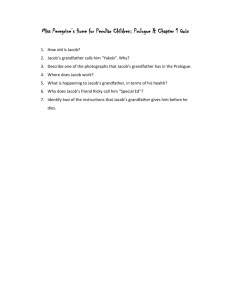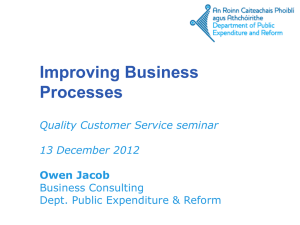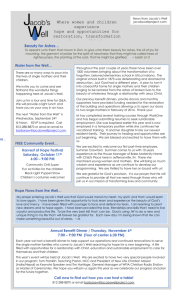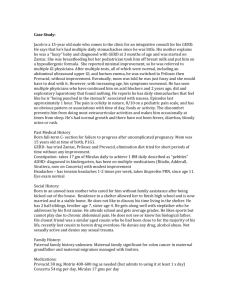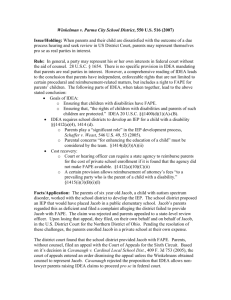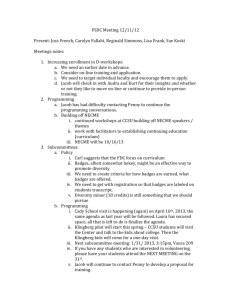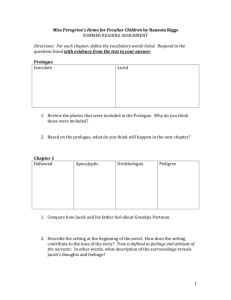jacob wrestles at peniel - Free Reformed Churches of North America
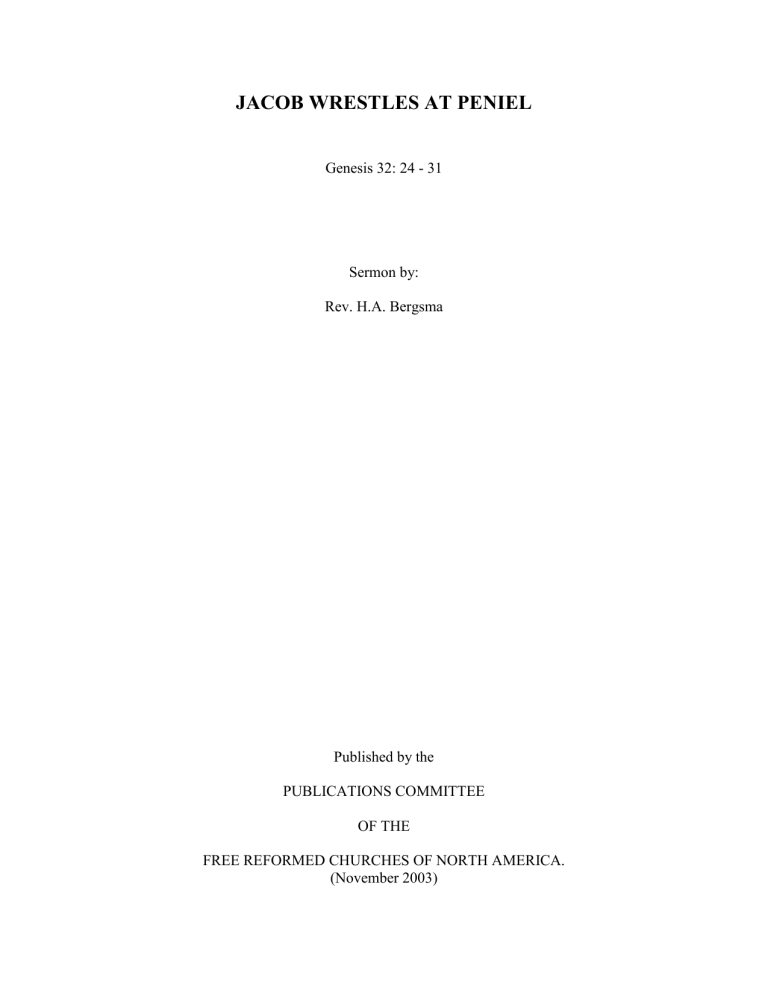
JACOB WRESTLES AT PENIEL
Genesis 32: 24 - 31
Sermon by:
Rev. H.A. Bergsma
Published by the
PUBLICATIONS COMMITTEE
OF THE
FREE REFORMED CHURCHES OF NORTH AMERICA.
(November 2003)
LITURGY:
Votum
Psalter 162
Law of God
Scripture: Genesis 32: 1 – 31
Text: Genesis 32: 24 – 31
Psalter 84
Congregational Prayer
Offering
Psalter 233: 1, 2, 3, 4
Sermon
Psalter 192: 1, 3, 4
Thanksgiving Prayer
Psalter 290: 4, 5, 2
Benediction
Doxology: Psalter 375: 5
2
Congregation of the Lord,
The life of Jacob has been anything but smooth.
He looked back on it as an old man once, and said, “
Few and evil have been the days of the years of my life.”
(Gen. 47:9)
Certainly, Jacob could speak of blessings; but he could also speak of sorrow and grief that he, by his own sin, had brought on himself.
His conduct has not always been the best.
Perhaps this is why many people can secretly identify with the character of Jacob, not because Jacob is such a hero of faith who can be followed, but because Jacob is so much like the average, everyday Christian, showing all the warts and wrinkles of an imperfect nature.
Jacob was a Christian, no doubt about it; because he showed that he could not do without the blessings of God.
We often see Jacob striving for those blessings, but as often we see him striving in the wrong way for them, reaching-out past God, because he was afraid to miss-out on them.
And of course, that was no way to receive his spiritual inheritance.
God therefore had to correct him at times and set him straight; and it became the struggle of Jacob’s life.
This struggle became a memorable event for Jacob one night, and a lesson learned, which every believer can identify with somehow.
Let us consider this struggle for our learning …
JACOB WRESTLES AT PENIEL
1.
Meets-up With An Unexpected Opponent
2.
Discovers An Unknown Strength
3.
Crowned With An Unforgettable Outcome
Congregation,
Jacob was on his way back to the land of Canaan, on his way home.
He has spent 20 years working for his uncle Laban in Padan-Aram, and working hard for him.
3
With the blessings of God, his work has been richly rewarded.
When he came to Laban 20 years ago, he came with only a staff in his hand.
Now, on his way home, he has wives, children and herds of cattle.
God has blessed him abundantly, and shown him clearly that He was with him and would continue to be with him.
At a certain moment God had told him, “Jacob, you must return to your country, and to your family, and I will do you good.”
And Jacob obeyed.
On his way, God assured him of Divine protection, because at one point an army of angels met Jacob; he could actually see them with his own eyes, and he knew, “surely
God is with me!”
At long last, having travelled many days, Jacob looked up and saw the Brook Jabbok in the distance, and beyond it, the Jordan River, and the borders of Canaan.
But at the moment that he saw the borders of his homeland, a fear gripped his heart …
Esau!
What must he do about his brother Esau?
He feared that Esau would still to be angry with him for the wrong he did him some 20 years ago.
Surely, so Jacob feared, Esau may very well come out to kill him!
And indeed, when some servants returned, whom Jacob has sent ahead, his fear was confirmed, because they reported back to him,
“Your brother Esau is coming to meet you and there are 400 men with him.”
“Then Jacob,” so we read, “was greatly afraid and distressed.”
Immediately Jacob engaged a plan of action; he divided his company of wives and children and servants and cattle into 2 groups, reasoning that if one group got attacked, the other group would be able to escape.
Then Jacob prayed to God to deliver him and his wives and his children from the hand of his brother Esau, and at the same time confessed his unworthiness, expressed his fears, and pleaded on the promises of God.
4
After all this, he laid down to rest.
But Jacob’s rest was far from peaceful, because the next minute he was on his feet again, busily arranging 3 divisions of gifts to be sent on their way to meet Esau … 580 head of cattle to be precise, perhaps, so Jacob thought, that would make Esau more friendly.
After this, Jacob laid down again, and with his family around him, he settled in for the night.
But again, Jacob could not sleep, and the next moment he was on his feet again.
This time he has his wives and children rise up with him, and under the cover of darkness he put them all across the Brook Jabbok.
We may wonder why, but we cannot be certain.
Perhaps Jacob was afraid that Esau and his band would catch them in broad daylight crossing the stream, which would mean certain death for him and his loved ones.
A more likely reason is that Jacob was still very restless, and that he needed to be by himself and ponder the situation, and perhaps attempt to engage in prayer again.
But all our text says is that Jacob was left alone; apparently he stayed behind on the other side of the Brook Jabbok.
Now, we have spent a few moments on the verses that come before our text, and for a purpose.
We need to understand that Jacob’s spirit was still very restless and uneasy about the whole situation.
True! He has the promised blessings of God, and even God’s visible protection around him.
He has confessed to God his unworthiness and implored God for His mercies.
And yet Jacob was troubled; he was still unsure if Esau will not kill him and destroy his family.
Perhaps some of us are surprised that Jacob was still troubled.
But then I must say that this is not uncommon with believers.
5
I can acknowledge that God has given me many blessings; I can see His protecting hand around me from day to day; I can pray and confess and plead God’s promises … but when I rise from my prayer, I might still not have found peace.
Why is this?
Well, look at Jacob.
He thought he still had to face the enemy in his own strength; he thought that something of his cleverness and something of his own manipulations could save the day.
Jacob still leaned on some of his own abilities, and consequently, the danger threatening him left him still fearful and distressed.
But there is more; Jacob was so pre-occupied with the threat of Esau and how to turn aside such a threat that he neglected to look into his own heart to see if he was in the clear with God.
True, he confessed his unworthiness (and we can never overdo such confession); but after he confessed his unworthiness, he came away from his prayer and acted as if he still had to save his own neck in the best way possible.
Therefore, at about the same time, while Jacob was still leaning on his own cleverness and manipulations, he was stopped in his tracks and met up with an Opponent he had not expect.
That night, Jacob, as he was all by himself, did not meet up with Esau, about whom he was so troubled, but he met up with a Man, who wrestled with him, so we read,
“until the breaking of day.”
Some Bible commentators have suggested that this Man must have been an angel, perhaps Michael the Archangel.
But Jacob himself testified later,
“I have seen God face to face.”
Jacob’s unexpected Opponent was the Lord Himself.
The Lord came to Jacob that night and wrestled with him.
6
And the meaning of wrestling here is not just a jabbing of the conscience, but of an armlock-to-armlock-rolling-in-the-dust-wrestling-match; brute force was pitted against brute force.
The Lord, in the form of a man, which later would become the Saviour’s form of the
God-Man, showed up, and physically sought to put Jacob down.
Perhaps you may wonder why God showed Himself an Opponent to Jacob, though He had told him to return to the Land of Canaan, and promised His help.
Well, we know that God’s ways are at times mysterious and hard to understand.
God has more often taken this sort of action with His people.
I remind you of Moses whom God sent to Egypt to deliver the people of Israel.
But on his way to Egypt we read in Exodus 4:24 that God sought to kill Moses!
Why does God sometimes show Himself an Opponent to the very persons He has sent out with His promises?
Because God wants to show them that He alone will work out His promises, and that He alone must be acknowledged for all the blessings.
This is what the alone-ness of Christ on the cross would signify … He alone can work salvation; man cannot, and may not add his two cents worth to it.
Man, with all his self help, must come to an end with himself; man’s self-reliance must be broken, and if this means threatening a Moses with death, or putting a Jacob down through an all night wrestling match, so be it.
Dear people! God will not always come across in a quiet and gentle way to convince us of His salvation.
He sometimes comes across in a threatening way, and show himself a strong Opponent.
He will then strive with you through His Holy Spirit.
He will wrestle you to the ground and cause the dust fly up around you, so to speak.
It may then seem that all the blessings are taken from you and that all His promises have been pulled back.
Does this mean that God is finishing you off?
7
If this were the case, He would have put you down long ago.
If that were the case with Jacob, God would have done away with Jacob right after he had deceived his brother Esau for the first time.
But the Lord wrestled with Jacob; and the Lord will strive with us, when He sees that we are not yet fit to enter the spiritual Land of Canaan; when the Lord sees that we have not yet put down completely our self-reliance; when He sees that we still want to hang on to some of our own cleverness; when He sees us trying to salvage God’s blessings as much as possible yet in our own strength.
The Lord will strive with us until we are down.
But dear people! While the Lord is striving with us in such ways, He is busy working by the power of His Spirit, and by grace we begin to discover a strength in us, a strength that we never knew we had, as we must consider, in the second place, Jacob Wrestling at
Peniel, Discovering an Unknown Strength.
We read in our text that,
“When He (the Lord) saw that He prevailed not against him, He touched the hollow of his thigh, and the hollow of Jacob’s thigh was out of joint as He wrestled with him.”
Jacob was down and out.
The tie was broken.
A victor began emerging and a loser began to submit.
Up till this point Jacob had been able to match his human strength with the human strength of his Opponent.
He had been able to hold his ground so that his Opponent could not overpower him.
And has Jacob’s life and walk with God not been that way up until this point?
Certainly, Jacob could plead on the promises of God.
Those promises were given him in his younger days at Bethel, when God told him, “I am the Lord God of Abraham thy father and the God of Isaac; the land whereon thou liest, to thee will I give it and to they seed.”
8
Jacob had some wonderful promises from God; but with all those promises, he had acted as if he, Jacob, still had to make them come true by his own powers.
Up till now, Jacob’s life had been the life of a clever, cunning, quick-witted man who lived by the rule of “help yourself if you want results.”
And help himself he did!
He had cheated his brother Esau of his birthright; he had tricked his blind, old father
Isaac in giving him the best blessings; for twenty years he had lived in Padan-Aram, thinking it necessary, not only to work, but to work cleverly for the things he wanted.
Jacob had lived the life of faith, but not as his fathers Abraham and Isaac had done.
Jacob had mixed his faith-life too much with his own works and wit.
Jacob had lived with the blessings of God, but as often, had obscured the graciousness of a blessing God by showing to the world that he could still take care of himself.
Jacob had been too much under the influence of a nasty “help-yourself” attitude.
His manner of trying to appease Esau proved it.
Jacob had still relied too much on himself; he had still been too confident in his own abilities.
That is, until the Lord wrestled with him, and touched the hollow of his thigh.
The Lord came and the Lord dealt with Jacob, and with one mighty touch, He threw his hip out of joint and Jacob had to admit defeat.
His manly vigour could not hold him up anymore; his cleverness and cunning would not carry him any longer.
Jacob was finished; defeated.
He was now at the mercy of the Lord.
Congregation, it may sound strange to hear this; but it is a blessing in disguise when we come to that point; painful perhaps, but blessed … to be at the mercy of the Lord.
Are any of us still combining our faith with a help-yourself-spirit?
Are any of us still self-reliant and predisposed to reach out past God?
It is so natural, because there is so much of Jacob in us too.
9
Perhaps we do pray that God’s promises become true in our life; but then we rise from our prayers thinking that we still have to make those promises come true.
Do we then not rely too much yet on ourselves?
Do we then not have still too much confidence in ourselves?
We cannot enter into the Canaan of rest in such a way.
Jacob couldn’t.
The Lord had to wrestle with Jacob until he was at the mercy of the Lord, without strength, clean broken, crippled, and down.
But there is where the mercy of the Lord began to work full force upon Jacob.
The mercy of the Lord gave him a new strength; a strength he never knew he had; a strength that is part of faith as a gift of God.
Jacob could feel it surging through his system; it touched his very existence and the heartstrings of his emotions.
The Prophet Hosea understood what was going on and explains this in the 12 th
chapter of
Hosea … Jacob “had power over the angel and prevailed; he wept and made supplication unto Him.”
Jacob could feel what the Apostle Paul, later on could articulate,
“When I am weak, then
I am strong.”
The Lord wrestled with Jacob and with a mighty touch told him as it were
… “My grace is sufficient for thee, for my strength is made perfect in weakness.”
And Jacob found this new strength, because he wrapped his arms around a wrestling
Saviour, and clinched Him with the words, “I will not let Thee go except Thou bless me.”
With a desperate prayer, Jacob the loser became Jacob the winner, winning it of the Lord.
The mercies of the Lord are great, dear people!
He lets Himself be won-over by those who are weakened, defeated in the struggle to hold themselves up.
He lets himself be won-over by those who have desperately wrapped their arms around
Him, pleading the blessings which they can no longer win in their own strength.
10
Jacob won with the Lord when the Lord finally defeated him.
Perhaps you know something about being defeated by the Lord, but at the same time winning His mercies.
Perhaps the Lord has had to wrestle you to the ground, to put you down, only to give you a new strength, with which you have won a victory over the Lord.
You may then also be sure that the Lord will crown such a victory with an Unforgettable
Outcome, in the last place.
Jacob would never forget that he had a wrestling match with the Lord once, at the Brook
Jabbok.
God would make sure of this.
Jacob could soon after enter into promised Canaan.
Jacob’s attitude changed; and his relationship with God changed.
He could see the blessings and promises and protection of the Lord in a new light.
At this time, Jacob also received a new name, and this new name became the passport of entry.
The Lord drew a confession out of Jacob,
“What is thy name?”
And Jacob meekly answered and said
“Jacob.”
And with this name Jacob confessed his whole former life – Jacob – deceiver, the selfsufficient-help-yourselver.
Then Jacob received a new name –
“Israel”
- Prince of God;
“For” the Lord told him,
“Thou had power with God and men and has prevailed.”
It is no doubt an unforgettable moment, beloved, when the Lord, by His power, draws out of us the confession of our old name, and upon such a confession, gives a new name; when He exchanges our old passport for a new one, and gives us passage and entry into the Promised Canaan.
“Israel, Prince of God, because you had power with God and men, and have prevailed.”
Are you travelling with Jacob this hour, dear people?
11
Or are you headed in an entirely different direction?
If so, you must be warned that your way will not take you to the Promised Land.
I urge you therefore to follow Jacob, even if it means that you have to face a wrestling match with the Lord, and put you at His mercy.
There goes Jacob, congregation.
Across the Brook Jabbok.
Do you see him?
He doesn’t walk as manly anymore as he used to.
There is a limp to how he walks.
If you look carefully, there’s an old passport sticking out of his back pocket.
You can’t see it, because his face is towards Canaan, but there is a smile on his face and a tear in his eye.
“Peniel” – “I’ve seen God face to face, and my life is preserved!”
Jacob is on his way home.
That limp and that old passport he will have to settle for, for the rest of his life on earth; unforgettable mementos of the Lord who wrestled with him at the Jabbok.
Some day that limp and that old passport will be laid in the grave never to rise again, and
Israel, with his new passport in hand, signed in the blood of his Saviour Jesus Christ, will enter into the Eternal Canaan of rest.
No more night there; no more darkness; the night of wrestling is over … and see what our text ends with … “the sun rose upon him.”
Come, let us become a companion of Jacob, who became crowned by the name of Israel.
Amen.
12
